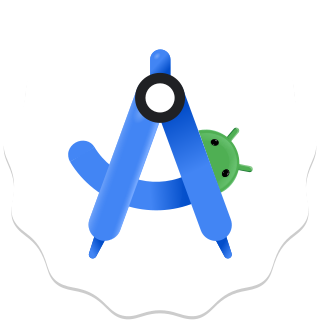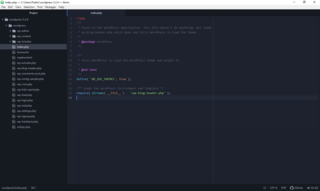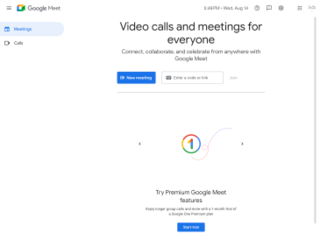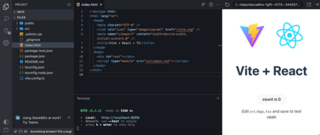Related Research Articles
Mobile app development is the act or process by which a mobile app is developed for one or more mobile devices, which can include personal digital assistants (PDA), enterprise digital assistants (EDA), or mobile phones. Such software applications are specifically designed to run on mobile devices, taking numerous hardware constraints into consideration. Common constraints include CPU architecture and speeds, available memory (RAM), limited data storage capacities, and considerable variation in displays and input methods. These applications can be pre-installed on phones during manufacturing or delivered as web applications, using server-side or client-side processing to provide an "application-like" experience within a web browser.

Adobe AIR is a cross-platform runtime system currently developed by Harman International, in collaboration with Adobe Inc., for building desktop applications and mobile applications, programmed using Adobe Animate, ActionScript, and optionally Apache Flex. It was originally released in 2008. The runtime supports installable applications on Windows, macOS, and mobile operating systems, including Android, iOS, and BlackBerry Tablet OS.
Google Workspace is a collection of cloud computing, productivity and collaboration tools, software and products developed and marketed by Google. It consists of Gmail, Contacts, Calendar, Meet and Chat for communication; Currents for employee engagement; Drive for storage; and the Google Docs Editors suite for content creation. An Admin Panel is provided for managing users and services. Depending on edition Google Workspace may also include the digital interactive whiteboard Jamboard and an option to purchase add-ons such as the telephony service Voice. The education edition adds a learning platform Google Classroom and today has the name Workspace for Education.

ChromeOS, sometimes styled as chromeOS and formerly styled as Chrome OS, is a Linux distribution developed and designed by Google. It is derived from the open-source ChromiumOS, based on the Linux kernel, and uses the Google Chrome web browser as its principal user interface.
Smartface is a mobile technology company focusing on enterprise mobility in the cloud for mobile transformation in enterprises. Smartface is headquartered in Palo Alto with offices in New Jersey, Istanbul and Dubai.
Pearltrees is a visual and collaborative curation tool that allows users to organize, explore and share any URL they find online as well as to upload personal photos, files and notes. The product features a visual interface that allows users to drag and organize collected URLs, and other digital objects that themselves can be further organized into collections and sub-collections,(URLs). Users of the product can also engage in social/collaborative curation using a feature called Pearltrees Teams.

Xamarin is a Microsoft-owned San Francisco-based software company founded in May 2011 by the engineers that created Mono, Xamarin.Android and Xamarin.iOS, which are cross-platform implementations of the Common Language Infrastructure (CLI) and Common Language Specifications.
Mozilla is a free software community founded in 1998 by members of Netscape. The Mozilla community uses, develops, publishes and supports Mozilla products, thereby promoting exclusively free software and open standards, with only minor exceptions. The community is supported institutionally by the non-profit Mozilla Foundation and its tax-paying subsidiary, the Mozilla Corporation.
Adobe Edge is a discontinued suite of web development tools that Adobe Inc. started developing in 2011. The tools enhances the capabilities of other Adobe apps, such as Dreamweaver. The first app in the suite was the eponymous Adobe Edge, released in August 2011 as a multimedia authoring tool designed to succeed the Flash platform. In September 2012, Adobe renamed the app Edge Animate, and announced Edge Reflow, Edge Code, and Edge Inspect. Also packaged with the suite are Edge Web Fonts, the PhoneGap app, and an Adobe Typekit subscription. In October 2015, Adobe announced an end to the development of the Edge family. By the end of September 2019, all Adobe Edge products were removed from the Creative Cloud offering.

Android Studio is the official integrated development environment (IDE) for Google's Android operating system, built on JetBrains' IntelliJ IDEA software and designed specifically for Android development. It is available for download on Windows, macOS and Linux based operating systems. It is a replacement for the Eclipse Android Development Tools (E-ADT) as the primary IDE for native Android application development. Android Studio is licensed under the Apache license but it ships with some SDK updates that are under a non-free license, making it not open source.

Appcelerator is a privately held mobile technology company based in San Jose, California. Its main products are Titanium, an open-source software development kit for cross-platform mobile development, and the Appcelerator Platform.

Datadog, Inc. provides an observability and security SaaS platform for cloud applications. The platform helps corporations monitor servers, databases, software tools, and infrastructure services.

Atom is a free and open-source text and source-code editor for macOS, Linux, and Windows with support for plug-ins written in JavaScript, and embedded Git control. Developed by GitHub, Atom was released on June 25, 2015.
Google Cloud Platform (GCP), offered by Google, is a suite of cloud computing services that provides a series of modular cloud services including computing, data storage, data analytics, and machine learning, alongside a set of management tools. It runs on the same infrastructure that Google uses internally for its end-user products, such as Google Search, Gmail, and Google Docs, according to Verma, et.al. Registration requires a credit card or bank account details.

Anbox is a discontinued free and open-source compatibility layer that aims to allow mobile applications and mobile games developed for Android to run on Linux distributions. Canonical introduced Anbox Cloud, for running Android applications in a cloud environment.
Google One is a subscription service developed by Google that offers expanded cloud storage and is intended for the consumer market. Google One paid plans offer cloud storage starting at 100 gigabytes, up to a maximum of 30 terabytes, an expansion from the free Google Account storage space of 15 GB, which is shared across Google Drive, Gmail, and Google Photos.

Google Meet is a video communication service developed by Google. It is one of two apps that constitute the replacement for Google Hangouts, the other being Google Chat. It replaced the consumer-facing Google Duo on November 1, 2022, with the Duo mobile app being renamed Meet and the original Meet app set to be phased out.
DevEco Studio is the official integrated development environment (IDE) for Huawei's HarmonyOS operating system, built on JetBrains' IntelliJ IDEA software and Huawei's SmartAssist designed specifically for HarmonyOS development. It is available for download on Microsoft Windows and macOS based operating systems.
Warp is a proprietary terminal emulator written in Rust available for macOS and Linux. Notable features include Warp Drive for sharing commands across teams, Warp AI for command suggestions and assistance, and an IDE with text selection and cursor positioning.

StackBlitz is a collaborative online integrated development environment (IDE). The platform allows server-side software such as Node.js to be run entirely in the web browser, enabling fully online full-stack development. A number of web frameworks such as React, Next.js and Angular are supported.
References
- ↑ "Project IDX". Google for Developers. Retrieved 2024-05-16.
- ↑ Lardinois, Frederic (8 August 2023). "Google launches Project IDX, a new AI-enabled browser-based development environment". TechCrunch. Retrieved 11 April 2024.
- ↑ Claburn, Thomas. "Google teases Project IDX, an AI-infused code environment". www.theregister.com.
- ↑ "Google's Project IDX adds iOS, Android emulators, and more templates". ZDNET. Retrieved 11 April 2024.
- ↑ Heller, Martin (29 January 2024). "Google Project IDX: A promising next-generation cloud IDE". InfoWorld.
- ↑ Lardinois, Frederic (25 January 2024). "Google extends its Project IDX development environment with built-in iOS and Android emulators". TechCrunch. Retrieved 11 April 2024.
- ↑ Crouse, Megan (11 August 2023). "Google Wants You to Code in a Browser With Project IDX". TechRepublic. Retrieved 11 April 2024.
- ↑ Lardinois, Frederic (2024-05-14). "Project IDX, Google's next-gen IDE, is now in open beta". TechCrunch. Retrieved 2024-05-15.